Key takeaways:
- Self-compassion involves self-kindness, common humanity, and mindfulness, allowing us to acknowledge flaws without harsh judgment.
- Integrating self-compassion into prayer fosters vulnerability and acceptance, making it a safe space for expressing emotions.
- Building a supportive community enhances self-compassion by creating connections through shared vulnerabilities and empathy.
- Overcoming challenges in self-compassion includes recognizing negative self-talk and reframing self-care as essential for personal well-being.
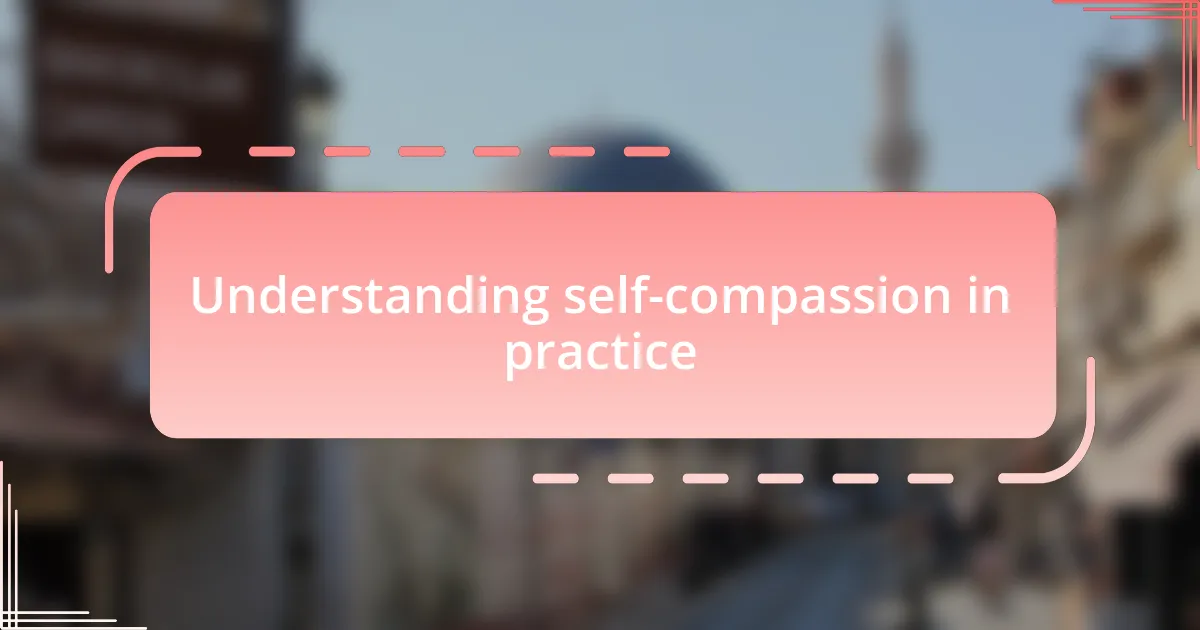
Understanding self-compassion in practice
Self-compassion is often misunderstood as being indulgent or weak, but in practice, it’s a powerful tool for mental and emotional well-being. I remember a particularly tough day when I struggled with feelings of inadequacy after making a mistake at work. Instead of berating myself, I paused and treated myself with the same kindness I’d offer a friend. This shift helped me regain my focus and clarity, demonstrating that understanding self-compassion means acknowledging our flaws without harsh judgment.
In practical terms, self-compassion involves three core elements: self-kindness, common humanity, and mindfulness. For instance, when I face setbacks, I remind myself that experiencing imperfection is part of being human. This acknowledgment transforms my perspective, allowing me to view my challenges not as isolated events but as experiences shared by many. Have you ever felt alone in your struggles? Realizing that others share similar feelings can be profoundly comforting and empowering.
Engaging with self-compassion daily can be as simple as taking a moment to breathe deeply and reflect in times of distress. I often practice this when I encounter stressors throughout the day, reminding myself to pause, acknowledge my feelings, and respond gently. It has helped me cultivate a sense of peace in chaos, which reflects the essence of self-compassion in practice: treating oneself with care and understanding during hardship. How might you infuse moments of self-kindness into your daily routine?
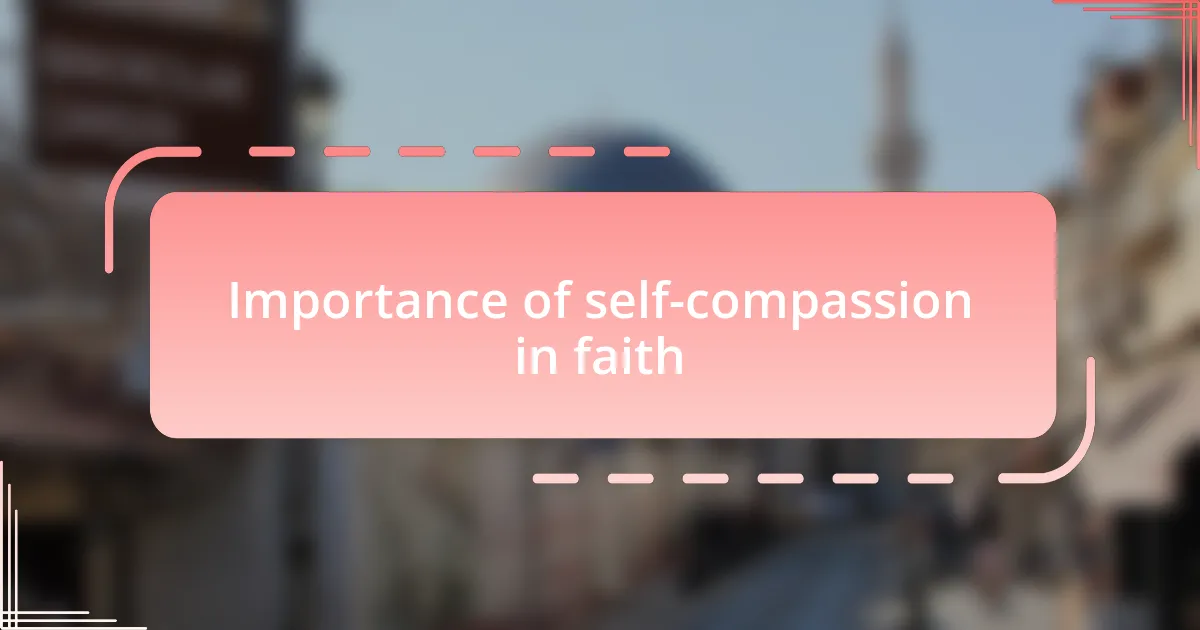
Importance of self-compassion in faith
Self-compassion plays a critical role in nurturing our faith. When I encounter moments of doubt or struggle, I find that allowing myself to feel compassion eases the burden of expectation I place on my spiritual journey. Have you ever felt overwhelmed by the idea of being “perfect” in your faith? Understanding that we are all imperfect beings can bring us closer to the divine, as it allows us to embrace our humanity while still striving for growth.
In my spiritual practice, I’ve learned that self-compassion fosters a deeper connection with God or whichever higher power resonates with us. For example, during times of prayer, I consciously remind myself that how I’m feeling—whether anxious, angry, or confused—is valid. This practice shifts my mindset from one of guilt to a space of acceptance and love, which mirrors the unconditional nature of many faith traditions.
Moreover, I believe that self-compassion enriches our relationships with others. When I treat myself kindly, I often find myself extending that compassion outward, viewing others through a lens of empathy and understanding. Can you recall a time when your own struggles made you more empathetic towards someone else’s journey? That shared human experience deepens our faith community, reinforcing the notion that we are all in this together, supported by compassion and grace.
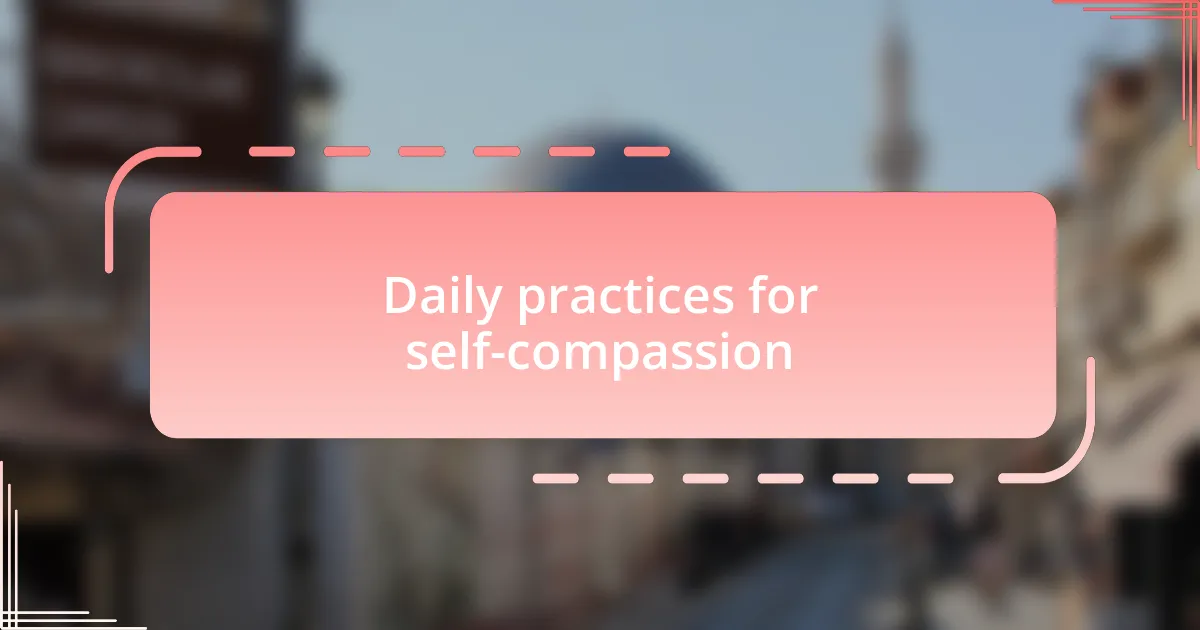
Daily practices for self-compassion
Daily practices for self-compassion can take various forms and truly enrich our spiritual journey. One simple yet powerful practice I incorporate is the mindful pause. Throughout my day, I take a moment to breathe deeply, reflecting on my feelings without judgment. Have you noticed how just a minute of focused breathing can shift your perspective? It’s incredible how this small act reminds me to treat myself with kindness, especially when I’m feeling overwhelmed.
Another technique I’ve found effective is journaling. I write down not only my gratitude but also any self-critical thoughts that pop into my head. Taking the time to confront those negative feelings allows me to challenge them directly. In doing so, I often uncover layers of anxiety that don’t even belong to me but rather expectations from others or society. When was the last time you examined where your self-doubt stemmed from? This practice encourages a shift toward self-acceptance and paves the path for greater compassion within myself.
Lastly, I believe that incorporating affirmations into my routine can significantly enhance my self-compassion. Each morning, I choose a phrase that resonates with my journey, such as, “I am a work in progress, and that’s perfectly okay.” Saying this aloud or writing it down becomes a gentle reminder when I face challenges. How do you reaffirm your worth during tough moments? These daily affirmations provide me with a foundation of self-love that empowers my faith and nurtures my spirit.
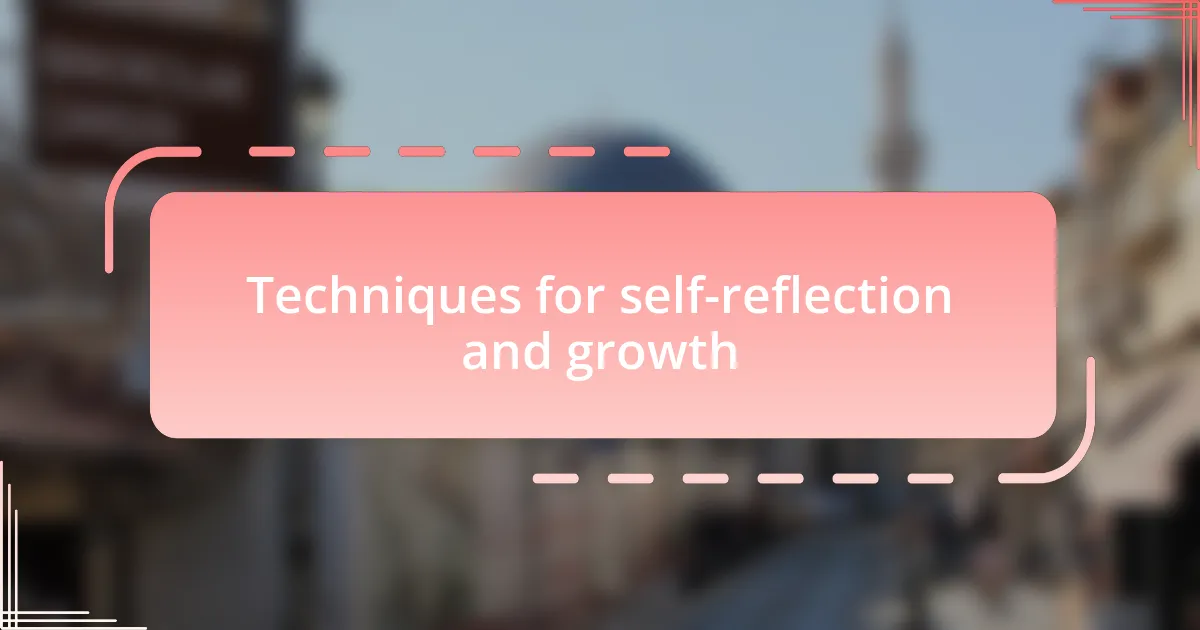
Techniques for self-reflection and growth
One technique that has significantly aided my self-reflection is the practice of mindful observation. I take a few minutes each evening to sit quietly and observe my thoughts without attempting to change them. This moment of stillness often reveals patterns in my thinking that I hadn’t noticed before. Have you ever felt like your thoughts were swirling around like leaves in the wind? Recognizing these patterns helps me to gain insights into my emotional responses and fosters growth.
Another valuable practice I utilize is engaging in open dialogue with a trusted friend or mentor. Sharing my thoughts allows me to articulate feelings I might otherwise keep bottled up, and their perspectives often provide clarity and reassurance. I remember a time when I was struggling with feelings of inadequacy, and after discussing it openly, I realized those feelings were part of my journey, not my identity. Isn’t it refreshing to find support in others, especially when navigating tough emotions?
Lastly, I make it a point to set aside time for creative expression, whether it’s drawing, writing poetry, or even cooking. These activities not only provide a therapeutic outlet but also help me process my feelings in a unique way. I’ve found that when I let my creativity flow, I can better understand my experiences and emotions. How often do we allow ourselves the freedom to explore our feelings through creativity? This technique has not only enhanced my self-awareness but has also enriched my spiritual journey, deepening my connection to myself.
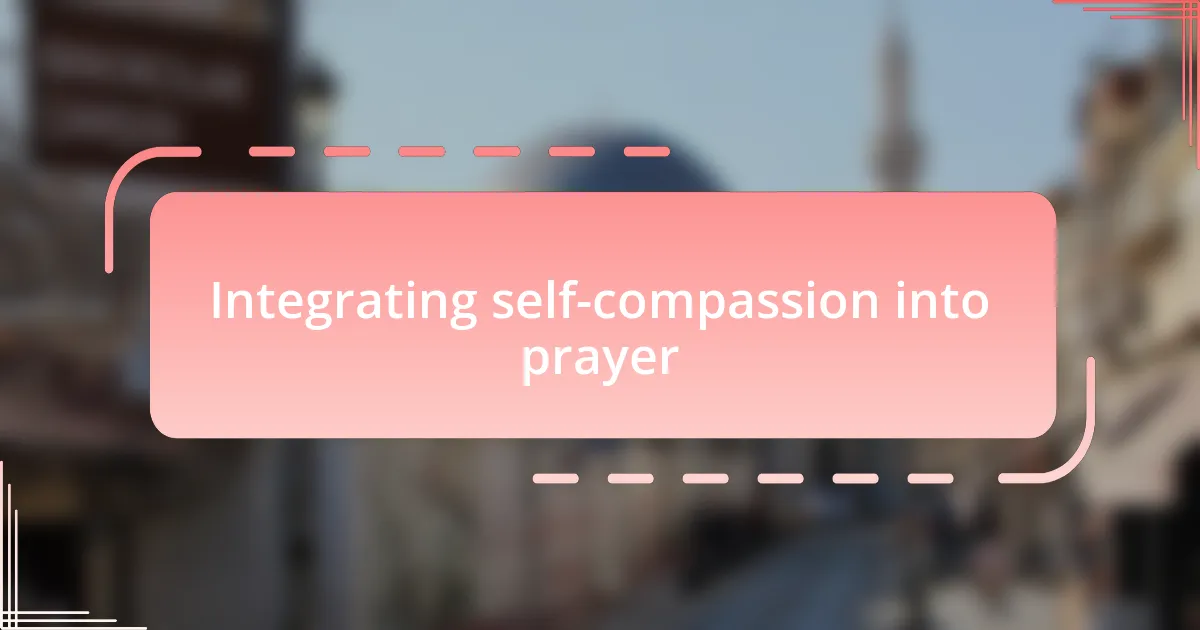
Integrating self-compassion into prayer
Integrating self-compassion into prayer can be a transformative experience. I often find that when I pause to pray, I intentionally acknowledge my imperfections and struggles just as I would for a dear friend. For instance, during my prayers, I might say, “I’m doing my best, and that’s enough,” which allows me to embrace my flaws and foster a loving dialogue with myself. How often do we give ourselves the grace we freely offer to others?
I’ve learned that incorporating self-compassion into prayer also means allowing vulnerability. When I pray, I don’t shy away from expressing my doubts and fears, knowing that these feelings are part of my human experience. I remember one evening feeling overwhelmed and expressing this through prayer. In that moment, I found solace in understanding that it was okay to feel this way. Isn’t it uplifting to realize that our prayers can be a safe space for all our emotions?
Additionally, I often end my prayers with affirmations of self-kindness. I say phrases like, “I am worthy of love and compassion,” which helps solidify my intention to treat myself with kindness throughout the day. This practice reminds me that self-compassion isn’t just a fleeting thought but a commitment I make to myself regularly. When was the last time you acknowledged your own worth in your prayers?
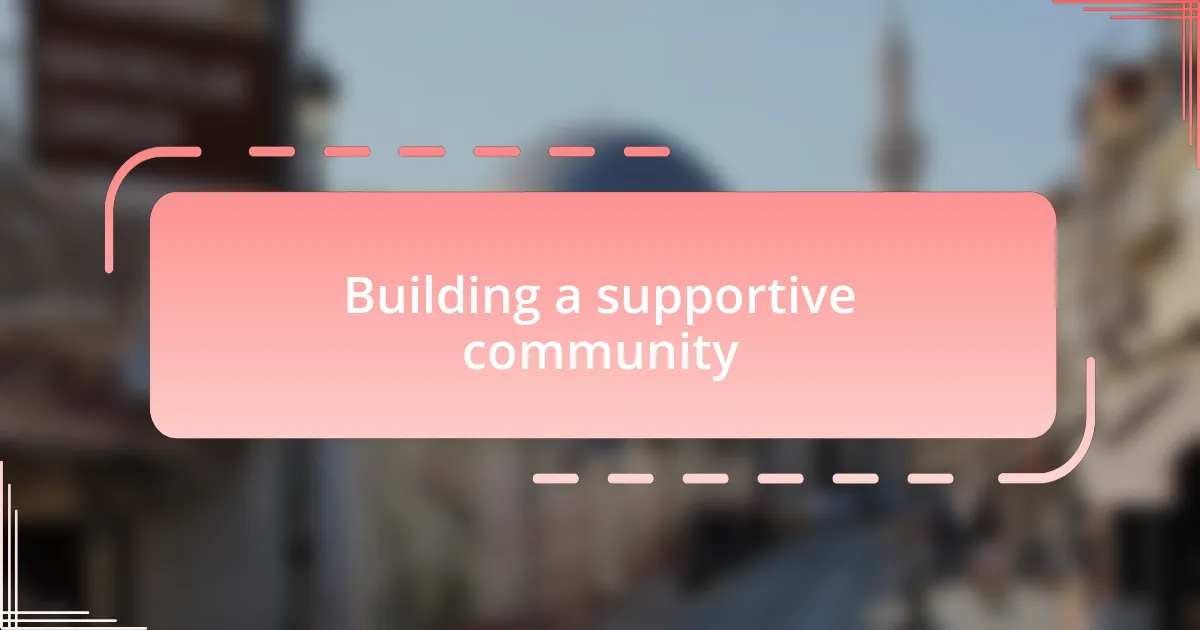
Building a supportive community
Building a supportive community is vital for cultivating self-compassion. I’ve seen firsthand how surrounding myself with empathetic individuals can create a haven where everyone feels understood. For instance, in my local faith group, we share not only our successes but also our struggles, fostering an environment of acceptance. Don’t you think it’s powerful to know that there are people who genuinely care and support you in your journey?
Moreover, participating in group activities centered around self-reflection can enhance this sense of community. I remember attending a workshop where we practiced sharing our vulnerabilities, and it was truly eye-opening. Hearing others voice their insecurities made me realize that I wasn’t alone in my battles. What if we all took the time to listen to one another’s stories? I believe it could deepen our connections and make us more compassionate towards ourselves.
As I continue to nurture these relationships, I realize that building a supportive community also requires us to be vulnerable ourselves. I often challenge myself to be open about my challenges, creating a ripple effect where others feel safe to do the same. When was the last time you took a moment to be genuine in front of others? This simple act can transform usual interactions into profound moments of connection and support.
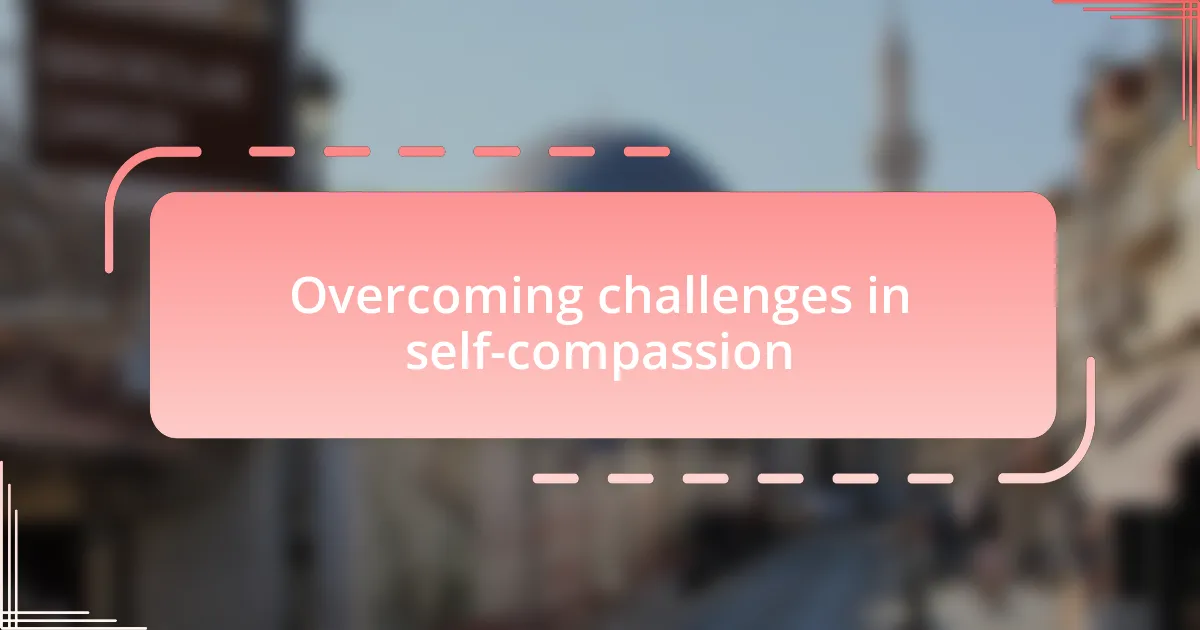
Overcoming challenges in self-compassion
Self-compassion can feel like a monumental task, especially when facing life’s setbacks. I remember a time when I was heavily critiqued at work. Instead of practicing compassion, I found myself spiraling into negative self-talk, questioning my worth. Perhaps you’ve felt this way too, where instead of being your own advocate, you become your harshest critic. It’s a challenge we often face, but recognizing this pattern is the first step toward change.
Another hurdle I encounter is the fear of being perceived as selfish. Society often equates self-compassion with self-indulgence, making it difficult to prioritize my needs without guilt. There was a season when I felt overwhelmed yet hesitant to carve out time for self-care. However, I learned that acknowledging my feelings is essential for fostering resilience. Isn’t it ironic how we often neglect our well-being in the name of being there for others? I now view self-compassion as replenishing my ability to support those around me.
Finally, embracing self-compassion in moments of failure can be particularly daunting. I vividly recall failing an important exam and grappling with feelings of inadequacy that lingered for weeks. Reflecting on that experience, I realized that allowing myself to feel disappointed while also offering grace was essential for my growth. Do you find it challenging to forgive yourself during tough times? I think it’s about creating a mental space that honors both our struggles and our inherent worth. This perspective shift has made a significant difference in how I approach life’s ups and downs.